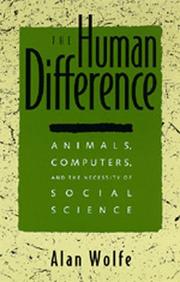| Listing 1 - 2 of 2 |
Sort by
|

ISBN: 0585274177 0520915615 0520080130 0520089413 9780520915619 9780585274171 9780520080133 Year: 1993 Publisher: Berkeley University of California Press
Abstract | Keywords | Export | Availability | Bookmark
 Loading...
Loading...Choose an application
- Reference Manager
- EndNote
- RefWorks (Direct export to RefWorks)
Are we losing touch with our humanity? Yes, contends Alan Wolfe in this provocative critique of modern American intellectual life. From ecology, sociobiology, and artificial intelligence to post-modernism and the social sciences, Wolfe examines the antihumanism underlying many contemporary academic trends. Animal rights theorists and "ecological extremists" too often downplay human capacities. Computers are smarter than we are and will soon replace us as the laws of evolution continue to unfold. Even the humanities, held in sway by imported theories that are explicitly antihumanistic in intention, have little place for human beings. Against this backdrop, Wolfe calls for a return to a moral and humanistic social science, one in which the qualities that distinguish us as a species are given full play. Tracing the development of modern social theory, Wolfe explores the human-centered critical thinking of eighteenth- and nineteenth-century scholars, now eclipsed by post-modern and scientistic theorizing. In the work of Durkheim, Marx, Weber, and Mead, human beings are placed on the center stage, shaping and interpreting the world around them. Sociology in particular emerged as a distinct science because the species it presumed to understand was distinct as well. Recent intellectual trends, in contrast, allow little room for the human difference. Sociobiology underlines the importance of genetics and mathematically governed evolutionary rules while downplaying the unique cognitive abilities of humans. Artificial intelligence heralds the potential superiority of computers to the human mind. Post-modern theorizing focuses on the interpretation of texts in self-referential modes, rejecting humanism in any form. And mainstream social science, using positivist paradigms of human behavior based on the natural sciences, develops narrow and arid models of social life. Wolfe eloquently makes a case for a new commitment to humanistic social science based on a realistic and creative engagement with modern society. A reconstituted social science, acknowledging our ability to interpret the world, will thrive on a recognition of human difference. Nurturing a precious humanism, social science can celebrate and further refine our unique capacity to create morality and meaning for ourselves.
Sociology --- Social sciences --- Sociobiology. --- Human ecology. --- Computers --- Methodology. --- Social aspects. --- Ecology --- Environment, Human --- Human beings --- Human environment --- Biologism --- Social aspects --- Ecological engineering --- Human geography --- Nature --- Human biology --- Human evolution --- Psychology, Comparative --- Social evolution --- Effect of environment on --- Effect of human beings on --- Methodology --- Sociobiology --- Human ecology --- american culture. --- animal rights. --- anthropology. --- antihumanism. --- artificial intelligence. --- cognitive ability. --- durkheim. --- ecological extremists. --- ecology. --- evolution. --- evolutionary rules. --- genetics. --- human beings. --- human capacities. --- human centered critical thinking. --- human difference. --- human. --- humanism. --- humanities. --- humanity. --- marx. --- mead. --- modern american intellectual life. --- modern social theory. --- morality. --- natural sciences. --- postmodernism. --- postmodernity. --- social sciences. --- sociobiology. --- sociology. --- weber.
Book
ISBN: 0520913507 0585054371 9780520913509 9780585054377 Year: 1993 Publisher: Berkeley University of California Press
Abstract | Keywords | Export | Availability | Bookmark
 Loading...
Loading...Choose an application
- Reference Manager
- EndNote
- RefWorks (Direct export to RefWorks)
A bold new interpretation of Aristotelian thought is central to Bernard Yack's provocative new book. He shows that for Aristotle, community is a conflict-ridden fact of everyday life, as well as an ideal of social harmony and integration. From political justice and the rule of law to class struggle and moral conflict, Yack maintains that Aristotle intended to explain the conditions of everyday political life, not just, as most commentators assume, to represent the hypothetical achievements of an idealistic "best regime." By showing how Aristotelian ideas can provide new insight into our own political life, Yack makes a valuable contribution to contemporary discourse and debate. His work will excite interest among a wide range of social, moral, and political theorists.
Communities. --- Justice. --- Social conflict. --- Communities --- Justice --- Social conflict --- Political Science --- Law, Politics & Government --- Political Theory of the State --- Class conflict --- Class struggle --- Conflict, Social --- Social tensions --- Interpersonal conflict --- Social psychology --- Sociology --- Injustice --- Conduct of life --- Law --- Common good --- Fairness --- Community --- Social groups --- Aristotle --- Aristoteles --- Aristote --- Arisṭāṭṭil --- Aristo, --- Aristotel --- Aristotele --- Aristóteles, --- Aristòtil --- Aristotile --- Arisṭū --- Arisṭūṭālīs --- Arisutoteresu --- Arystoteles --- Ya-li-shih-to-te --- Ya-li-ssu-to-te --- Yalishiduode --- Yalisiduode --- Ἀριστοτέλης --- Αριστοτέλης --- Аристотел --- ארסטו --- אריםטו --- אריסטו --- אריסטוטלס --- אריסטוטלוס --- אריסטוטליס --- أرسطاطاليس --- أرسططاليس --- أرسطو --- أرسطوطالس --- أرسطوطاليس --- ابن رشد --- اريسطو --- Pseudo Aristotele --- Pseudo-Aristotle --- アリストテレス --- Contributions in political science. --- Political and social views. --- adjudication. --- ancient greece. --- ancient greek philosophy. --- aristotelian thought. --- aristotle. --- best regime. --- class struggle. --- common good. --- community. --- conflict. --- distributive justice. --- ethics. --- everyday life. --- justice. --- modern social theory. --- monarchy. --- moral conflict. --- moral theory. --- morality. --- political community. --- political friendship. --- political intimacy. --- political justice. --- political life. --- political philosophy. --- political teleology. --- political theory. --- politics. --- reciprocity. --- rule of law. --- social harmony. --- social integration. --- social theory. --- sociology.
| Listing 1 - 2 of 2 |
Sort by
|

 Search
Search Feedback
Feedback About UniCat
About UniCat  Help
Help News
News